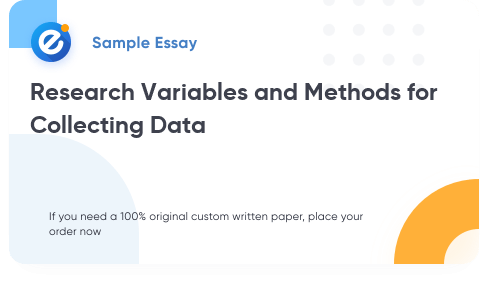
Definitions of Variables
It is widely known that one of the most important concepts in research is that of the variables. There are various types of research variables that are usually the focus of many research studies. Studies often involve the examination of the relationship between different variables. The research studies usually include a single variable at a time or the relationship between a given variable and other variables (Kantowitz, Roediger, & Elmes, 2008). The concept of a variable is used to refer to the variation within a class of entities. An entity is an object of an individual or a group of people. A variable varies, which means it can take different forms or have different values. In any given research study, variables are the fundamental elements that are measurable and observable. This paper discusses research variables and methods for collecting data.
Types of Research Variables
Dependent Variable
Variables can be categorized as dependent, independent, intervening, control, and moderator. The dependent variable is usually seen as the variable that “assumes” the effects of another variable. It is defined as change witnessed in the population of the research study when one or more factors change or they are modified. In this regard, the dependent variable in itself is seen as the problem (Axinn & Pearce, 2008).
Calculate the cost of essay
Independent Variable
On the other hand, the independent variable is the assumed “cause” of the witnessed problem. Therefore, this variable is perceived as the presumed reason for any variation or “change” in the dependent variable. This variable is measured to get its effects, and it is manipulated by the researcher (Andrew & Halcomb, 2009).
Moderator Variable
A moderator variable is a particular type of independent variable that can be selected for study to investigate whether it changes the relationship between the independent and the dependent variables. The major distinction between the moderator and the independent variable lies in how the researcher perceives each in the study (Kantowitz, Roediger, & Elmes, 2008).
Control Variable
It is practically difficult for the researcher to include all the possible variables in each study. As a result, the researcher should endeavor to neutralize or control all other extraneous variables that are likely to have an impact on the relationship between the dependent, independent, and the moderator variables (Kantowitz, Roediger, & Elmes, 2008).
Limited Time
special offer
Methods for Collecting Data
Questionnaires
Methods for collecting data include interviews, questionnaires, observation, and unobtrusive measures. The use of a questionnaire is the most efficient method of data collection. Responses are restricted by the questions that are asked in the instruments. They tend to be objective, and as a result, the respondents may not be willing to offer honest answers (Andrew & Halcomb, 2009).
Interview
The use of the interview is the second important data collection technique that can be employed for a group or individual respondents. It is the most commonly used data collection method. It enables the interviewer to ask the respondent direct questions. It is a one-on-one interaction or a group, and as a result, it saves time (Axinn & Pearce, 2008).
Observation
It is one of the methods that a researcher can use to collect data directly from the source. The method involves the real-time data collection and involves describing the behavior occurring in the present as opposed to the past. One of the disadvantages of the method is that at times, personal bias is unavoidable (Axinn & Pearce, 2008).
Benefit from Our Service: Save 25%
Along with the first order offer - 15% discount, you save extra 10%
since we provide 300 words/page instead of 275 words/page
Unobtrusive Measures
The data is not gathered directly from the source, but it is taken from a secondary source. Examples of the secondary source could be archives and company records. The advantage of this method of data collection is that it is free from any form of biases such as those from the respondents and interviewers (Andrew & Halcomb, 2009).
Conclusion
In conclusion, a variable refers to the variation that exists among various attributes used in the measurement of various values. There are various types of variables, including dependent, independent, intervening, control, and moderator. Finally, there are various methods for data collection such as interviews, questionnaires, observation, and unobtrusive measures.

